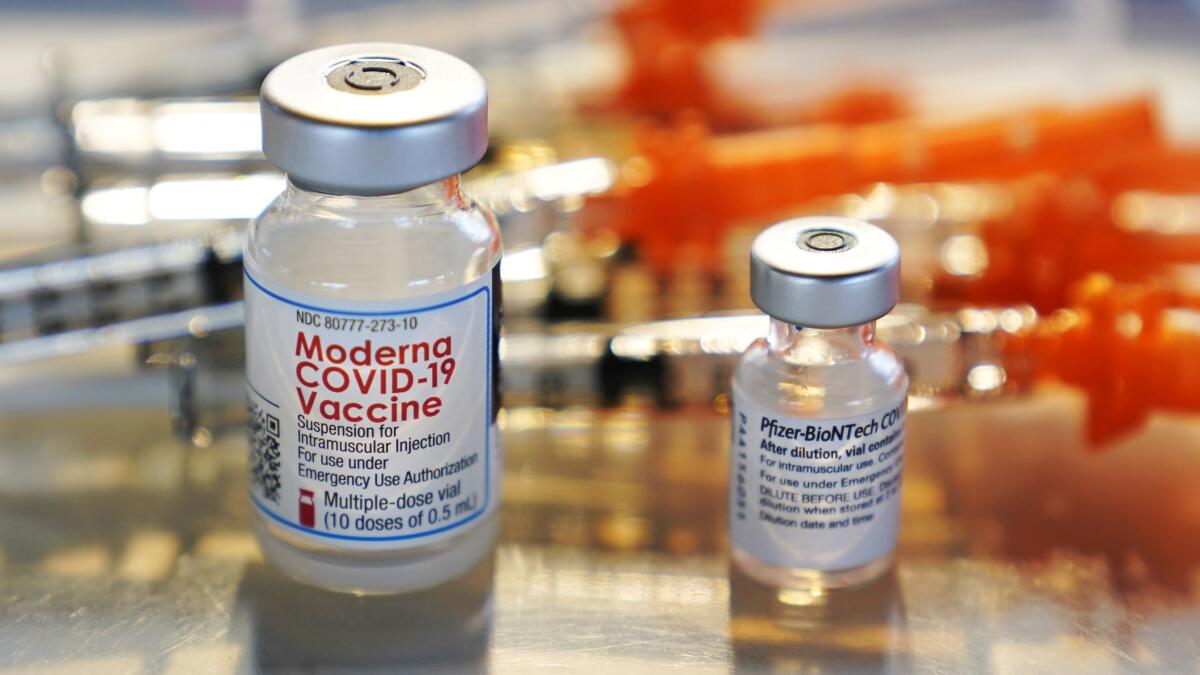Column: Scientists and experts get plenty wrong. But we should still trust them

- Share via
I follow the science and trust the experts, but let’s be honest: They don’t always get it right.
For instance, we recently learned that although public health experts had told us repeatedly that the Moderna and Pfizer-BioNTech vaccines were equally effective, that’s not actually true. Half a dozen studies, the New York Times reported, now show that Moderna offers more protection.
And that’s just the most recent screw-up. Don’t wear masks, they told us in the beginning, until they changed their minds. COVID-19 is unlikely to be spread by asymptomatic people — oh, oops, yes it is. Wipe down your packages — um, no, actually that’s not necessary.
A few days ago, irked by the most recent turnaround, I suddenly recalled a book I’ve had on my shelf for the last 37 years. Titled “The Experts Speak,” it is a nearly 400-page doorstopper written in 1984 by Christopher Cerf and Victor Navasky that claims to be the “definitive compendium of authoritative misinformation.”
Navasky and Cerf set out to lampoon the world’s experts by showing how wrong they’ve been over the last 2,000 years about everything, including, they noted, facts, theories, dates, geography, predictions about the future, conclusions about the past and, yes, even assertions about the present.
“We are ready to concede that the experts are occasionally right,” they wrote. “As a matter of fact, some of our colleagues have argued persuasively that the experts are right as much as half the time.”
OK, they were being snarky, but their compendium is no joke. Here are a handful of the thousands of entries:
“Stocks have reached what looks like a permanently high plateau,” Yale economics professor Irving Fisher said on Oct. 17, 1929, just a week before the market crash that devastated the U.S. economy.
“Roosevelt will be a one-term president,” wrote political columnist Mark Sullivan in the New York Herald in 1935. Roosevelt was elected to four terms and died in office in 1945.
“[Copulation] is … dangerous immediately after a meal,” wrote Dr. Bernard S. Talmey in his treatise on the “science of sex-attraction” in 1919.
“A man-made moon voyage will never occur regardless of all future scientific advances,” said Lee DeForest, an American inventor who has often been called the “father of the radio,” in 1957.
“Clearing and colder, preceded by light snow,” was the official New York City weather forecast for March 12, 1888, the day of the blizzard of ’88, which killed more than 400 people.
“For the majority of people, smoking has a beneficial effect,” Los Angeles surgeon Ian G. Macdonald told Newsweek in 1963.
I think I needn’t go further. Their message is clear. Don’t believe everything you hear, even from someone with an advanced degree. Especially when it predicts the future. Furthermore, even when the experts all agree — they might still be wrong.
But having said all that, what’s the alternative?
With all due respect to Navasky and Cerf, no number of wrong assertions by a scientist or expert truly undermines the value of study, knowledge, experience, experimentation, data-gathering and the scientific method. (Nor do I think the authors meant to suggest it did.) And just because the experts make mistakes, that doesn’t mean that they aren’t right vastly more often than they’re wrong, or that they don’t know a lot more about viruses than you and I do.
What we sometimes forget is that science and expertise don’t exist in a world of perfectly discernible truth and objectivity, but in one of uncertainty. Especially when it comes to advising on policy, scientists’ conclusions and experts’ recommendations are based, as often as not, on estimates and hypotheses, on projections and modeling. It is necessary to weigh evidence, reconcile contradictory findings and make judgments, sometimes with incomplete information.
During the COVID-19 pandemic, scientists and policymakers have obviously been under pressure to move quickly. At the beginning, little was known about the virus, but policy recommendations were urgently necessary. Studies were sped up and assumptions were made, some of which didn’t bear out. (There are currently more than 360,000 entries in the World Health Organization’s database of global literature on the coronavirus.)
Unfortunately, mistakes, when they occur, give ammunition to skeptics. Mistakes encourage laypeople to trust their own anecdotal observations — or the baseless assertions of irresponsible people around them — rather than authoritative sources.
What’s more, Americans — or at least a subset of them — have a long tradition of distrusting authority and people they see as pointy-headed know-it-alls. Historian Richard Hofstadter wrote a whole book in 1963 about “anti-intellectualism” in the United States, arguing that many Americans believe their own common sense “is an altogether adequate substitute for, if not actually much superior to, formal knowledge and expertise.”
The Donald Trumps of the world take advantage of that. “The experts are terrible,” said the demagogue-in-chief in 2016. Later he made empty promises like this one about COVID in March 2020: “It’s going to go away, hopefully at the end of the month.”
Sure, I now wish I’d gotten the Moderna vaccine rather than the Pfizer, but data evolve (and Pfizer is effective). It’s easy to be irked by botched predictions and inaccurate assertions. But to discount rigorous methods, objective standards and open-minded inquiry — to discount science and expertise — is Dark Ages thinking. It’s a much bigger mistake than doing a 360 on mask-wearing or which vaccine works best.
More to Read
A cure for the common opinion
Get thought-provoking perspectives with our weekly newsletter.
You may occasionally receive promotional content from the Los Angeles Times.











